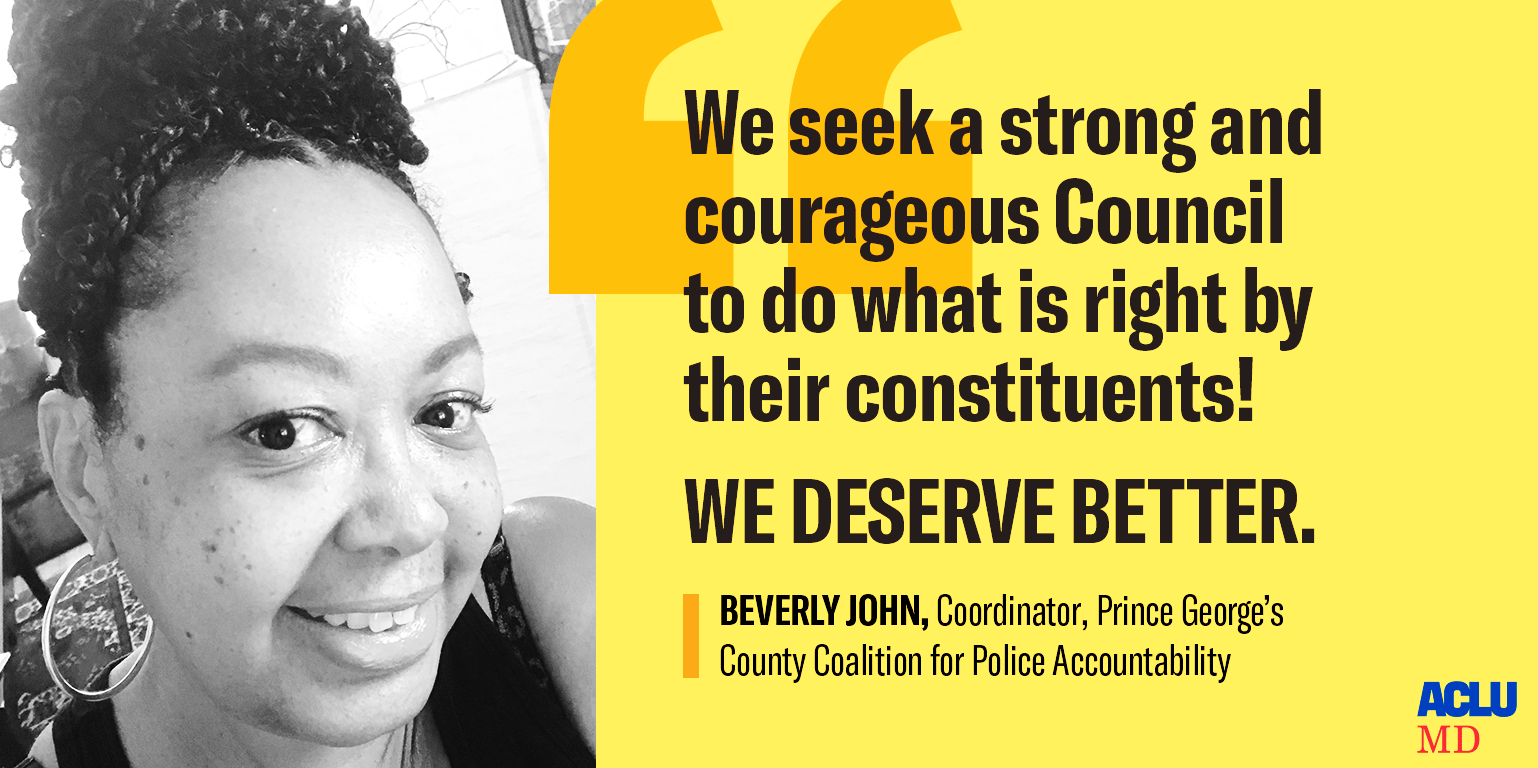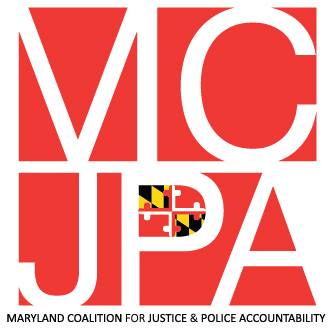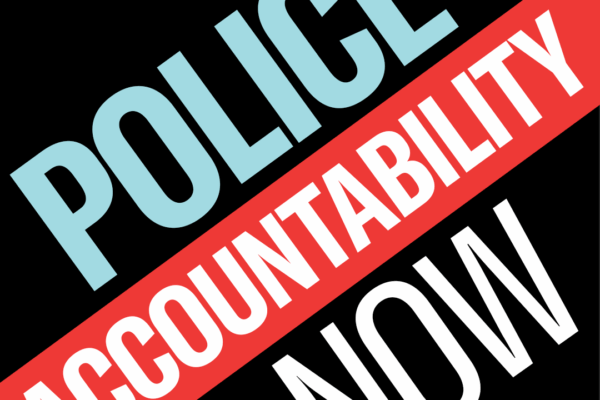The following comment can be attributed to Beverly John, Coordinator of the Prince George's County Coalition for Police Accountability:
"After meeting with Council staff last Thursday and being told the PAB bill was unlikely to be discussed this week, the Prince George's County Council scheduled a second hearing this morning on the Police Accountability Board legislation. The meeting agenda and eComment period dropped into the Council website Friday evening, May 6, with a registration deadline of Sunday, May 8th! The Maryland Open Meetings Act doesn't specify how much advance notice the public should be given, but it does require that notice be given. Posting the agenda and meeting details on your website on a Friday evening is not 'giving notice!' Prince George’s County residents deserve a more democratic and less secretive process for something as vital as police accountability in our County."
###
BLOG – No Justice, No Peace: Prince George’s County Needs Real Police Accountability Now!
APRIL 29, 2022 - 12:15PM

Guest Blog
By Beverly John
Coordinator, Prince George’s County Coalition for Police Accountability
This Tuesday, members of the Prince George’s County Coalition for Police Accountability and supporters across the state were scheduled to finally get an opportunity to voice our concerns to our County Council on legislation to create the County’s Police Accountability Board (PAB) as mandated by HB 670, the Maryland Police Accountability Act of 2021. Unfortunately, once again, there were attempts to undermine Prince George’s taxpayers in being heard.
For months our coalition has reached out to the County Executive and the appointed workgroup of law enforcement and County government staff who were tasked with drafting this legislation. We eventually received a response to our letter to the County Executive that defended the lack of transparency and exclusion of the community in this process, which defies the intent of the bill passed by the General Assembly.
We have reached out to the County Council Chair and other members of the council to share our concerns about the recruitment and selection of PAB members that was completed even before the draft legislation was presented to the Council. We have since reached again to the Council to share national best practices from the National Coalition for Civilian Oversight of Law Enforcement (NACOLE) on how to implement police accountability boards. And, we have offered amendments to the County’s bill, which is barebones, and mostly cut and pasted from the legislative text of HB 670. However, as Delegate Shaneka Henson noted recently related to the Anne Arundel PAB bill, “there are no enumerated restrictions to the powers of the county police accountability board.” The proposed bill in Prince George’s does note the PAB will “make recommendations on changes to policy that would improve police accountability in the county.” Advocates agree that HB 670 created a floor, not a ceiling for what is possible. Our concerns must be heard and incorporated into the Prince George’s PAB bill. We persist!
We have sought meetings to discuss our concerns with no response. We have faced barrier after barrier, from no public town halls or educational sessions for the community on this critical issue to no opportunity to dialogue and ask questions. For the County to wait to open the comment portal to submit oral and written testimonies until 9:30 pm on a Friday with a Monday 3 pm deadline before the hearing on Tuesday is unacceptable. Even worse, for this Tuesday’s hearing on the County’s bill that was scheduled to start at 11:30 am, the residents who signed up on time to testify were deprived of an actual link to testify and told, two hours after the hearing had started, that the bill would not be heard until after 2 pm. Several folks who had been patiently waiting to provide their testimony had to leave because of work commitments. Once again, being left out of the process.
With that said, we remain focused on the many questions related to the PAB’s implementation first and foremost. For example, who are the pre-selected members of the new PAB that will be presented to the County Council for a vote? By what criteria were they selected? How will the County PAB impact how the multiple local municipalities discipline officers in their departments? And have municipality leaders been made aware of this process?
The County’s clandestine actions show a clear disdain and disrespect for County residents. They show a desire to keep constituents mis- and uninformed on issues that directly impact their public safety as it pertains to holding law enforcement accountable when harm is done to the community.
The communities that are most negatively impacted by excessive use of force and over-policing must be included in the discussion on disciplinary accountability. Between 2016 and 2019, there were more than 6,800 use of force cases, of which 94 percent involved use of force against Black or Brown residents. Remarkably, the department’s internal review process decided that of all these 6,800 uses of force, 99.8 percent were “justified.” The Graham report noted that the “Department’s internal review process for uses of force relies heavily and disproportionately on white supervisors who have expressed racist views or engaged in discriminator conduct” (Graham Report at 85-86). Police cannot be trusted to investigate themselves. We have 6,800 (and counting) residents who filed complaints between 2016-2019 to the County’s current Citizen Complaint Oversight panel that may want to have some say in this process!
There are directly impacted families in our county who have been held in limbo and traumatized for decades awaiting some form of justice, seeking answers as to why officers killed, maimed, and traumatized their loved ones. We advocated and worked with the Maryland General Assembly during the 2021 session to get the baby step of HB 670 passed. The opposition lost in 2021, and now we see the strategy to deny even this small modicum of progress from passing at the County level. We seek a strong and courageous Council to do what is right by their constituents! We deserve better.
Related Content

Coalition Sounds Alarm As PAB Bills Undermine Accountability to Communities Across State
Stay Informed
Sign up to be the first to hear about how to take action.
By completing this form, I agree to receive occasional emails per the terms of the ACLU’s privacy statement.
By completing this form, I agree to receive occasional emails per the terms of the ACLU’s privacy statement.

